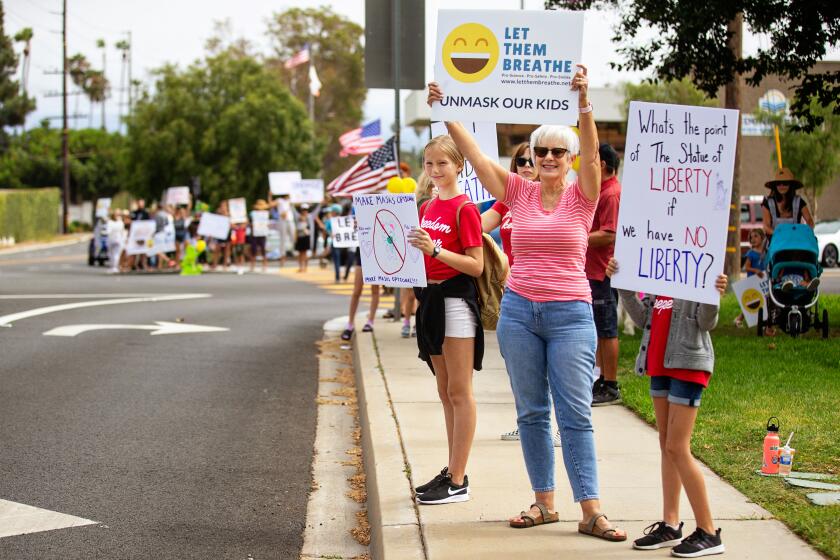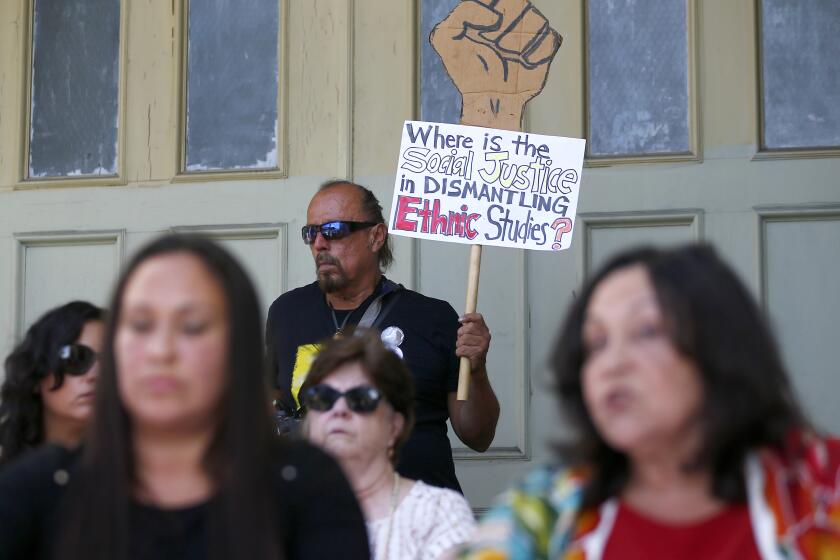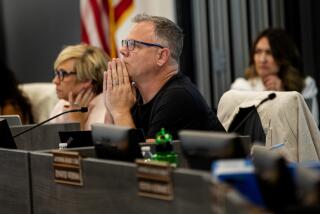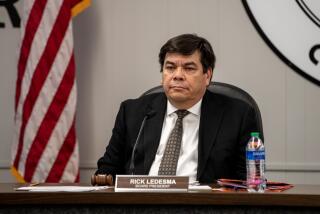Revenge recalls are hitting California schools. That’s not helping
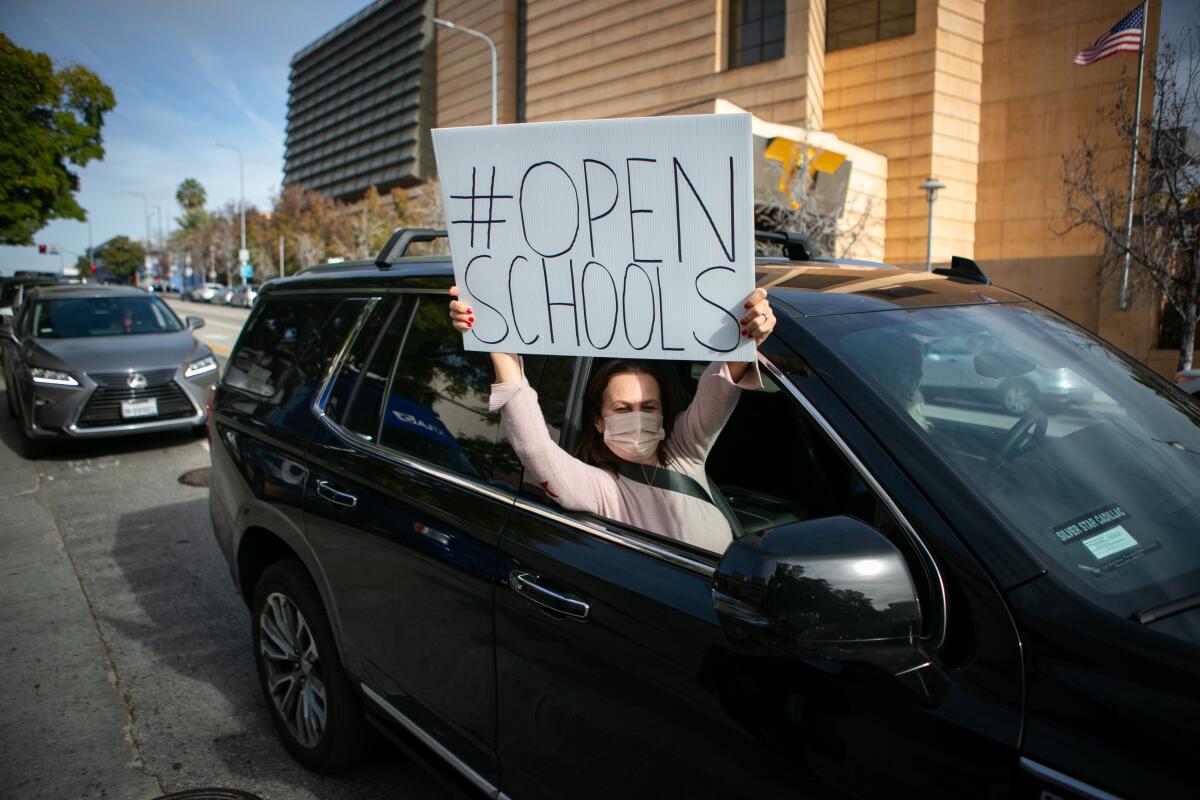
- Share via
Judging by the number of recall campaigns against school boards this year, there are some very angry parents out there. According to Ballotpedia, a nonpartisan election tracker, there have been 67 school recall efforts launched nationwide in 2021, targeting 174 board members. That’s dozens more than in any year dating back to at least 2009; in fact, it’s more than twice as many officials under the gun than in any of those years.
And get this: Fully a third of the recall movements are in California. The 22 campaigns have gone after 48 board members. Three of five trustees in the Fairfax Elementary School District in Bakersfield were targeted for “poor leadership, self-interest and vengeful behavior,” in a recall effort led by an incumbent who lost his seat in the 2020 election. In Santa Monica-Malibu Unified School District, the complaints allege fiscal irresponsibility, lack of transparency and conflict of interest. In West Sonoma County Union High School District, parents went after three board members over the consolidation of two high schools.
But most of the efforts revolve around frustration that school districts did not reopen campuses for in-person instruction until late in the 2020-21 school year. It’s part and parcel of the recall fever that unsuccessfully targeted Gov. Gavin Newsom, largely over his COVID-19 policies, which some Californians saw as overly cautious.
Most of the school recall attempts are unlikely to succeed as well, at least if history serves as a predictor. In many cases such efforts fall short by failing to gather enough signatures for a petition. As of Thursday, only 14 of the 22 California recall attempts were still underway; most of the rest failed. A couple of targeted officials resigned, but no one has been recalled so far.
Parents and a county board of education sued over California’s mask mandate for schools. Calm down, everyone.
Nonetheless, they create disruption and bad feeling, and the vast majority of those in play now are solely or mostly about reopening schools. This is a misguided use of the recall mechanism.
As we said about the Newsom recall effort, recalls should not be seen as a chance to revisit a previous election when some voters didn’t like the outcome. Nor should they be used because some people didn’t like a few decisions that were made. We agree with many of the school recall proponents that districts were far too hesitant about reopening classrooms. We were frustrated, too, about how little students were learning via video, with drastically reduced instructional hours, and how politicians were ignoring the science that said students could return to the classroom safely.
But school boards also were dealing with dicey situations. They feared liability if students or staff were severely sickened. We were still in learning mode about COVID-19, and in some ways, we still are. In addition, some teachers unions were more intransigent about opening than others. If many of the teachers simply refused to return to the classroom, what was the district supposed to do, fire them all when there was no one to take their places? In the absence of a state mandate to reopen once infection rates had fallen to certain levels, the unions held most of the cards.
Even if school board members made a wrong decision, that’s simply a wrong decision, not malfeasance. If voters don’t like what their elected board members did, they’re free to vote for someone else next time.
Nor would removing board members somehow change the future. The kids are back in school, and this time both officials and teachers unions appear intent on keeping it that way if it’s at all possible. Looking at the success of the Los Angeles Unified School District, which takes extraordinary measures to reduce and contain infections, classrooms should be able to stay open. At this point, recalling school board members over COVID-19 decisions that now are moot is merely vengeful.
Critical race theory is little understood, and it does not have to be divisive. But the uproar over ethnic studies in public schools is clouding the realities.
That’s not to say all the current school recall campaigns fall into this category. The proponents of a campaign to oust three board members of the San Francisco Unified School District cite reopening as a source of discontent. But they are also motivated by a ridiculously sloppy effort to rename schools, which included some downright inaccurate information — the sort that no history teacher would tolerate from students.
On top of that, it turned out that one of the three board members targeted, Alison Collins, had posted derogatory, stereotyping tweets about Asian Americans a few years before she was elected. When those were discovered earlier this year, Collins tried the tired old “comments taken out of context” excuse — though they weren’t taken out of context — instead of issuing a full-throated apology.
Stripped of her vice presidency of the board, Collins then turned around and sued the district and fellow board members, though her suit was quickly thrown out of court.
In a school district like San Francisco, where 30% of the students are of Asian descent, it is entirely understandable that many parents would not trust Collins to represent the interests of all students. And Collins’ actions against the school district she’s supposed to be supporting and improving offer evidence that she’s a problematic presence at a time when it’s especially important for the schools to run as smoothly as possible. To her credit, she was trying to act against anti-Latino and anti-Black racism that is, indeed, a problem in the schools, but fighting it with more racism as well as destructive lawsuits is unacceptable.
The allegations in the Santa Monica-Malibu Unified School District recall campaign fall more into the category of ongoing discontent over key issues that might make for a legitimate effort against the board. It involves claims of ongoing wasteful spending including overspending on administrative offices as well as conducting public business in private in violation of public meeting laws.
The three targeted board members dispute the allegations. But the recall proponents also accuse one of the three of violating the state’s Political Reform Act by voting for contracts that benefited her husband’s political consulting clients, which a Times investigation revealed in 2017. An investigation by the district attorney’s office ultimately concluded there was too little evidence to pursue charges — and the targeted school board member, Maria Leon-Vazquez, was reelected to her sixth term in office in 2020.
The award for the oddest school recall campaign of 2021 belongs to the Mount Diablo Unified School District in the Bay Area, which sought to unseat all five board members partly on the grounds that they failed to pass and oversee a sustainable budget. But one board member, Keisha Nzewi, pointed out that the district’s 2020 budget had been passed before she was elected, and the recall campaign targeted her before she even had a chance to vote on a 2021 budget.
Perhaps voters in the district were paying attention; the campaign never gathered enough signatures to go on the ballot.
Recalls are important and powerful tools of democracy that should be invoked only in cases of extraordinary wrongdoing. The trend this year raises the concern that relatively small and angry segments of parents will make it a habit to launch recalls whenever they don’t like an important board decision.
Could 2022 become another year of attempted recalls, this time over the adoption of ethnic studies curricula, which opponents continue to mischaracterize? No controversial decision will make everyone happy — that’s why they’re called controversial. But recalls weren’t meant to be an outlet for the losing side to start chopping off heads.
More to Read
A cure for the common opinion
Get thought-provoking perspectives with our weekly newsletter.
You may occasionally receive promotional content from the Los Angeles Times.
